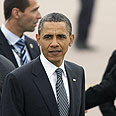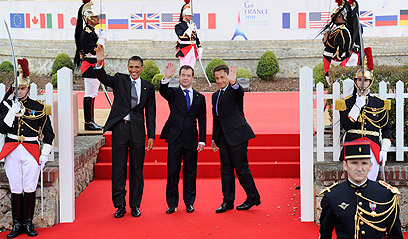
Obama. 'Leading Libya initiative'
צילום: MCT
Rich nations to offer $20B for Arab Spring
G-8 earmarks billions for Arab countries that have overthrown autocrats, such as Egypt, Tunisia, in order to help establish democracies. IMF also prepared to loan billions, though plans for spending money remain unclear
The Group of Eight rich nations will offer about $20 billion in pledges and commitments for Arab countries that have thrown out autocrats and are struggling to build new democracies, European officials said Friday.
The leaders of Egypt and Tunisia are meeting in this Normandy resort Friday with President Barack Obama and other G-8 and European Union leaders who are debating how and how much to aid the still-unstable Egyptian and Tunisian governments.
European officials say the global figure for pledges of aid will be about $20 billion. The officials spoke on condition of anonymity because the discussions are still under way.
It is unclear what the money would go for, or whether the figure includes money already promised for the region. US and European officials had said that it's too early to come up with firm dollar figures but that they would come up with a general plan to encourage investment and growth.
"They said their main problem was the economy. They need some support," European Commission President Jose Manuel Barroso told reporters Friday after meeting the Egyptian and Tunisian leaders. "I think they are ready. Let's do everything to support the Arab Spring. I think they can succeed."
The International Monetary Fund told the G-8 leaders it is ready to loan up to $35 billion to oil-importing countries in the Middle East and North Africa, to help the region meet goals on growth, stability, job creation and improving living standards.
The IMF says that Tunisia, Egypt and other non-oil producing countries in the region could need more than $160 billion overall in external financing through 2013.
France on Thursday said it would offer Egypt up to $250 million a year in development aid, and Britain pledged to expand its aid to the Middle East and North Africa to 110 million pounds, in an apparent effort to pressure G-8 partners into coughing up money, too.

Obama, Medvedev, and Sarkozy at summit (Photo: EPA)
Sarkozy: Gaddafi must leave
The G-8 leaders are also debating how to keep the fighting in Libya from undoing pro-democracy movements that have swept countries around the Middle East and Africa. Escalating violence in Libya worried the leaders of the United States, France, Britain, Russia, Germany, Japan, Italy and Canada as much or more than their own debts and joblessness.
Libyan leader Moammar Gaddafi "must leave, and Libyans should have a democratic future," French President Nicolas Sarkozy said Friday. He spoke alongside Obama after the two met, and said "we agree about the consequences of the Arab revolutions. ... On Libya our analysis is the same."
France however has urged the US to commit more to the NATO-led bombing campaign in Libya.
Obama "is leading that initiative to work with the Russians" on Libya, said Michael McFaul, Russia adviser at the National Security Council. Obama's deputy national security adviser, Ben Rhodes, told reporters in Deauville, "Russia has relations, not just in Libya but across most of North Africa. ... We can benefit from those types of consultations and contacts with them."
After the meetings Friday with Egypt and Tunisia, the G-8 summit will open up to leaders of several African countries, for discussions of what rich countries can do to bolster peace and security in Africa.
Heavy security in Deauville and elsewhere in France has so far deterred the kind of mass demonstrations that have disrupted G-8 summits in the past. Paris police stopped one of several protests planned in Paris against the summit, detaining about 50 demonstrators on Thursday.
- Follow Ynetnews on Facebook










